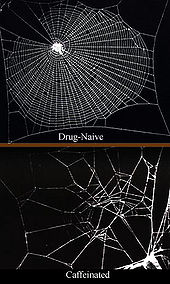
Drug-naïve
Encyclopedia

Animal
Animals are a major group of multicellular, eukaryotic organisms of the kingdom Animalia or Metazoa. Their body plan eventually becomes fixed as they develop, although some undergo a process of metamorphosis later on in their life. Most animals are motile, meaning they can move spontaneously and...
s who are not under the influence of any psychotropic substances (drugs
Psychoactive drug
A psychoactive drug, psychopharmaceutical, or psychotropic is a chemical substance that crosses the blood–brain barrier and acts primarily upon the central nervous system where it affects brain function, resulting in changes in perception, mood, consciousness, cognition, and behavior...
). This term usually refers to patients or animals undergoing drug-related testing, such as the effect of a certain drug on behaviour or cognitive ability.
More specifically, it could mean one of two things; the organism has a) never been exposed, or that the organism is b) not habituated to the drug in question.
This term may also describe a patient who has never received a particular medication. It is meant to differentiate those patients who may be on chronic pain or anxiety medications. When considering sedation or anesthesia, dosing regiments for these patients may be altered to compensate for their baseline resistance to the effects of those medications.

